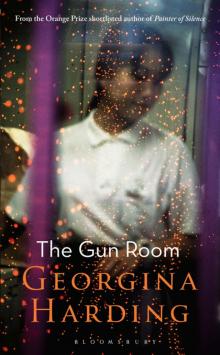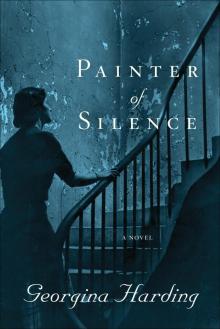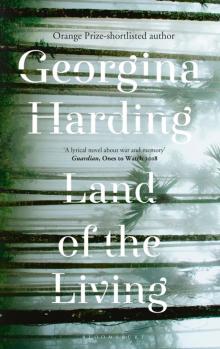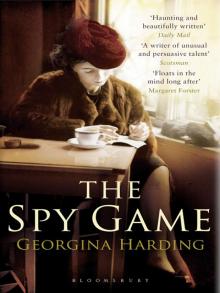- Home
- Georgina Harding
The Spy Game Page 2
The Spy Game Read online
Page 2
'Do you know how to work these things?' An apologetic whisper.
'Only just.'
Her voice is that of an educated Indian from India; she looks earnest, with heavy brows and dark-rimmed spectacles, bangles on her arm. A Ph.D. student perhaps, not so young as all that - as one gets older, other women begin to seem younger than they are - or a lecturer even, someone with a proper reason to be here.
There is nothing for it but to get up and try to help, ineffectually, until a librarian comes and saves us. Then I can return and begin a systematic working through of all the sources: the referenced dates of arrest, trial and sentencing; details of identities, contacts, methods. Just in case there is something there.
I had expected there to be acanteen, somewhere to eat, at least a pleasant cafi near by. Whenever I come to London these days I notice how many nice cafis there are, people eating out everywhere, sitting out even in April eating Mediterranean food; so much more happening than in the few years I lived here in the Seventies. But this place where the library is can hardly be called London; it is only some shabby northern suburb, whose name one knows from the tube map, out almost to Edgware on the Northern Line. The institutional red brick of the building seems misplaced on the poor terraced street, no shops in sight but a dingy newsagent and a greasy cafi of a kind I have not visited in thirty years, not since the days when I was a student myself. I order what I might have ordered then: strong tea and a bacon sandwich, on bread, not toast, white factory bread with the grease soaking into it. At least today I am hungry enough for that.
The cafi is busy. It must really be the only one around. The Indian woman is sitting alone and I take a seat at the same table.
She has nothing but a cup of tea.
'I did not know,' she says, 'what I should be eating here.'
She does not know what an outsider I am here, how rarely I come to London, that I scarcely ever meet people like herself. Will she be Muslim, Hindu, vegetarian? No bacon, anyway. I recommend egg and chips.
'I have a research grant,' the Indian woman says, looking out of the window, where a bus passes in the rain. 'Six weeks in London. I have never been to London before.'
'Ah. Well, you must see some other places besides this.'
'I shall, if my work allows.'
'Definitely you must take some time to look around.'
'And how long will you be working here?'
'I don't know,' I say, though I do in fact. I have three days here in London and then I shall fly to Berlin. 'I'm here in London for a bit, and then I'm going to Germany and Poland, well, not quite Poland actually but Russia.'
'It sounds very interesting.'
'Oh, it isn't really. It isn't my job or anything. I'm wasting my time really. It's just that now I have time to waste. My daughter's grown up, she's off my hands now, and my husband said I might as well do it. It's nothing important, you see, just a family matter. Just something I thought I might find out about, now that I have the time.'
It was to come out in court that the couple under surveillance had reached Waterloo by an unnecessarily devious route. There was no suggestion as to whether this was the result of whim or accident, or whether it was a deliberate but amateurish attempt to shake off anyone who might be tailing them.
They had come on the train from Salisbury, though they might have chosen to take one direct from Weymouth, having driven first as far as Salisbury and then left their car there - because of the icy roads, they were to say, but then the train itself had to be re-routed around Basingstoke, where previous heavy rain had washed away the line. If they had intended to do much shopping up in London, they no longer had the time. They must limit the trip to a threepenny bus ride to the market in East Street, Walworth, and be back by four-thirty for the meeting they had arranged.
Their names were Harry Houghton and Ethel Eliza-beth Gee, though Ethel was generally known as Bunty, the newspapers recorded. Both were employees at the Portland Admiralty Underwater Weapons Establishment, Bunty a clerical assistant of the lowest grade in the drawing-office records section, Harry a clerical officer in the innocuous-sounding Port Auxiliary Repair Unit, where he had access to Admiralty fleet orders and charts and particulars of ships. The two of them occasionally made these trips up to London, and once or twice they had stayed a night. (One of the newspapers refers to Bunty as a 'friendly spinster', which seems a coy way of saying that she slept with Harry and that at the hotel they visited she slipped a ring on her finger and pretended to be his wife.)
On this occasion it appeared that they were not planning to stay. Perhaps Bunty had to be home for the three old people she cared for: her eighty-year-old mother, her bedridden Aunt Bessie, her Uncle John (or Jack as some of the newspapers had it). Possibly Harry had some other intention. Surveillance on a previous trip he had made to meet his contact in London alone had picked up a comment about a girl from South Africa. The implication that he had been two-timing Bunty was the sort of thing people would have expected of spies, even if he was fifty-five and balding and had been living until recently in a caravan.
On returning to Waterloo Road Harry and Bunty crossed to the corner by the Old Vic. There a man walked swiftly to them and they shook hands. Gordon Lonsdale, as he called himself (real name K. T. Molody) was dark and stocky, with a style and spark to him that the others lacked. His manners too had charm, for he turned to Bunty and offered instantly to take the shopping basket that she was carrying. A normal thing, she said she thought it was, for a gentleman to do.
I know the place. I have been to the Old Vic a few times, when I lived in London and once or twice since. I know the street. It is a bleak street even now, the pavement running between the long blank wall of the theatre and the grimy breadth of Waterloo Road, the sound of traffic and the fumes holding there between the road and the high wall. It would have been even bleaker then, with the street line on the other side broken still by bomb and building sites. The only bright things to be seen would have been the posters on the theatre walls, advertising the current production. (According to the theatre notices, an unseasonal A Midsummer Night's Dream, the saturday matinie playing within the plush warmth of the theatre as the spies walked by in the cold.)
It must have been Lonsdale who chose that particular street, since he was the professional. He chose it for its anonymity perhaps, or for the fact that it was wide and straight and open, without corners or doorways or crossings to produce surprises.
He had used it as a rendezvous at least three times before; twice meeting Harry and Bunty together, and once meeting Harry alone. Once he had been observed meeting Harry elsewhere. On all these occasions they had been watched, shadowed, their conversations overheard by discreet couples, idlers, newspaper sellers, some with micro-phones and tape recorders in coat pockets. For four years now he or his colleagues or masters had summoned Harry by prearranged signals. The signals are of a type that make one laugh, nowadays, so quaint and clichid they seem. In real life, this happened: a spy summoned by a Hoover brochure coming in the post, or an advertising card (folded in half) for the Scotch House in Knightsbridge, to meetings in the London area, in suburban pubs such as the Maypole in Ditton Road or the Toby Jug in Tolworth, where he must carry a copy of Punch, or hold a newspaper in one hand or a glove in the other so that his contact could identify him.
It was almost dark by now, on a January day which had never quite become light, the damp surface of the road beginning to shine before the cars. They walked fast because it was cold, and also perhaps because they were tense and they wanted this over and done with, this meeting which was the greatest moment of danger for them all. Bunty walked between the two men, Lonsdale closest to the wall on the pavement side carrying her basket. Did they speak? Of what? Of the next meeting, of the delays of the journey, the rotten weather that made travelling such a nuisance, raising their voices as two lorries passed, a bus, making it hard to hear?
And then cars pulled up and men were coming at them shouting.
&n
bsp; 'The next thing I knew we were absolutely swooped on,' Bunty says from the witness box. 'At that time, I could not imagine what it was. I thought they were Teddy boys. Mr [Superintendent] Smith stood out. I could not imagine how one gentleman came to be mixed up with a lot of Teddy boys. There was so much noise I could not hear a word. I did not know who they were.'
At the time all she said was, 'Oh.'
Harry said, 'What?'
Lonsdale said not a word.
In her shopping basket were found four Admiralty test pamphlets, each of many foolscap pages; undeveloped film containing photographs of two hundred and thirty pages of Particulars of War Vessels, including specifications of HMS Dreadnought, Britain's first nuclear submarine; a package from the newsagent's and a tin of tongue.
Peter, sweetheart, how can you waste such a day as this? Out with you now, and take some air!'
That was what our mother would have said. She used to say it so often I could remember precisely the rhythm in her voice, the bright tone that carried clear from room to room across the house.
Peter was home from boarding school and it was summer. It must have been that first summer after we were alone but from the sort of day it was it could have been any one of them. All those summers when I look back on them seem the same.
Peter didn't go outside and there was no one to make him. Our mother used to worry over Peter because he was so pale and thin. Our father, on the days when he was home, did not seem to notice. He was gentle with us but sometimes that seemed a passing-by, as if we did not quite touch, and the soil and the leaves and the stems of the flowers in the garden were more tangible to him than we ourselves. All the light hours of the day he seemed to be in the garden, and when the days were long, supper was late so that we had filled ourselves on bread and peanut butter before he remembered that he must come in and cook.
On the days that he went to work, I used to get up at the same time and see him off, Peter a little later. Then Margaret came, each morning, and often Susan came to play or sometimes we went to Susan's house; and when Margaret was gone Mrs Lacey fed us lunch and after that the two of us went pretty much where we pleased, though Mrs Lacey was there if we needed her, if we were hungry or cut ourselves. The routine had come about so naturally that it never occurred to us to think that the adults must have talked and planned (discussed and decided as they had so many other things) and arranged the structure of our lives. For ourselves, we knew no control but only eased into a freedom of a kind that the adult world did not recognise, that was the unspoken freedom of the mother-less. No one to be answerable to, every minute of the day, no one to make us put our boots on before we went out, no one watching. When my mother was there I can remember saying, ten times a day, 'What shall I do now?' and waiting in all the vacancy of a child's boredom for a bright reply. That was not so any more. We were ourselves alone and thought for ourselves, and there were no words to it. We just did what we did.
Peter made aeroplanes. Each Saturday morning Dad took us into Cheltenham and Peter bought a new model kit and a wartime comic book, and in the week that followed he made the plane. He had British ones and German ones, and a few American bombers, and hung them from the ceiling of his room. He knew all about them, when they were built and where they fought and what kind of guns they had. When he was younger the whole house sounded with the dogfights he staged from his bed, with rattles of guns and ack-ack and dives and cries of Achtung!
On this day the house is quiet. Only the two of us in it and Peter intent in the playroom making the latest plane. I was singing a moment ago, out in the sun. I love to sing. I was singing songs round and round so that they never ended, singing out in the garden and in through the French windows, and now that I have stopped the empty rooms have fallen back more silent than before.
'What's the matter, Peter?'
Peter sits hunched with his hair falling to his eyes. The plane lies still in pieces on the table, only parts of it made. His face is blotchy, his hands tight and awkward with anger.
'Has your plane gone wrong?'
Till then I think we had not spoken of her. Not seriously at least, not in any way that I can remember. Peter had come home immediately afterwards, and we saw each other then, and we spent the various school holidays together, but we had not talked about it.
'How do we know she's dead?'
His eyes were shiny so that I did not look into them. He was almost crying. I looked at his fingers instead, how they were white with the pressure. They held the wing of the plane so tight that I was afraid he might break it and then he would cry for sure.
'Because they told us.'
Actually, but I could not have said this to him, I knew before they told me. I had had the thought from the moment of the phone call, when I was sitting playing cards with Susan and the News was on the television, and Mrs Lacey in the hallway outside the sitting room door said, 'When?' and Mrs Lacey's voice had a crack in it, which failed to resonate like a cracked bowl, and though she had tried to make the flat word sound ordinary its significance had seeped like a gas into the air of the adjoining room. And Mr Lacey was swearing for some reason, and not paying attention to her. He was looking at the television screen, angry at something he saw there.
'Because they told us,' Peter repeated, but the certainty had gone from the words.
Peter was collected now, more his usual self. He put the wing down. He began to peel the dried glue off his fingertips, stripping it off like skin and laying it on the spread newspaper on the table.
'That's just what they said. It doesn't have to be so just because they said it.'
He had his authority back now, the elder brother making statements to his sister. Usually when Peter said things he was right. He lived in a boy's sure world of knowledge and facts, names and dates and numbers. He could identify a make of car or an aeroplane, could quote the height of Everest or Freddie Trueman's bowling figures. He must explain. I did not speak but waited for him to explain.
'Think, Anna. What did they actually say?'
'What did they say to you?'
'Oh, nothing much. Just that Dad was coming to take me out. And I thought that was odd because it was a Tuesday. Then Dad came and Matron packed some things and we got in the car.'
Not what was said but what was done, that was what Peter told. In that case I would not tell either.
Daphne Lacey had to break the news. Even at the time I think I understood that it was hard for her.
Mrs Lacey's manner that morning was strange and sharp. She looked madder than ever. We had always thought secretly that she was a little mad. There was an odd, darting intensity to her, an effect that was heightened by her garish taste in clothes and the smudges of turquoise colour that she put like punctuation marks above her faded eyes. We once saw a bee-eater in the tropical cage at the zoo that had a dash of just that same colour about its eye. Peter whispered that it was like her even though Susan was with us, and Susan couldn't hear us, and we giggled.
The fog had cleared overnight. The morning was bright.
'I think I'll take Benjy for a walk after breakfast. You'll come with me, Anna, won't you, dear?'
We had been told that we must be nice to the Laceys because they came from Malaya and had been in a Jap camp. That meant that they had been prisoners of war. Mrs Lacey had suffered a lot and had lost a child. She looked too old and brittle to be Susan's mother but Margaret said that Susan was a replacement.
Susan was made to stay in, on some pretext or other, and I walked out with Mrs Lacey alone into the bright morning with the poodle beside us. The sun was surprisingly warm. The ice had turned to shiny puddles and there were drips coming off roofs and the dark twigs of trees. We walked down a path that led off the street, and then out past the houses and vegetable patches to a gate and a field. There were sheep in the field and Mrs Lacey put Benjy on a lead and let me hold it. She knew how much I liked to hold the dog. The hill rose smoothly up before the path and rounded off beneath a clear sky.
'There's something I have to tell you, Anna dear. You see, your father telephoned, he called us yesterday, he couldn't come back last night. He asked me to tell you something.'
She didn't put her arm around me or anything, and I did not look at her but only at the trodden path and the grey dog with his wagging dish-brush tail, and the lead connecting me to him.
'Your mummy's gone to heaven.'
I couldn't picture heaven. In the wood the beech trees were bare and if you looked up the sky was a brilliant blue between their branches. Mrs Lacey's heaven would be lush and green and filled with tropical flowers, orange and purple and crimson with petals like tongues.
'There was an accident, he said. He said that it was very quick, very sudden. It must have been over very quickly.'
I do not think that I spoke.
I saw the dog before me and the beeches, and coming out from the trees again beneath the hill I saw the sharpness of the light on the winter grass. These things I would remember. The clean form of the hill and the scar in its side where stone had been quarried and a thorn bush grew in a spiky black outline from a crack in the bared rock. A drystone wall cutting across. I would remember them always.
The church stood where we came back into the village, by the field that was the playground. When we got to it, Mrs Lacey suggested going in.

 Harvest
Harvest The Gun Room
The Gun Room Painter of Silence
Painter of Silence Land of the Living
Land of the Living The Spy Game
The Spy Game The Solitude of Thomas Cave
The Solitude of Thomas Cave